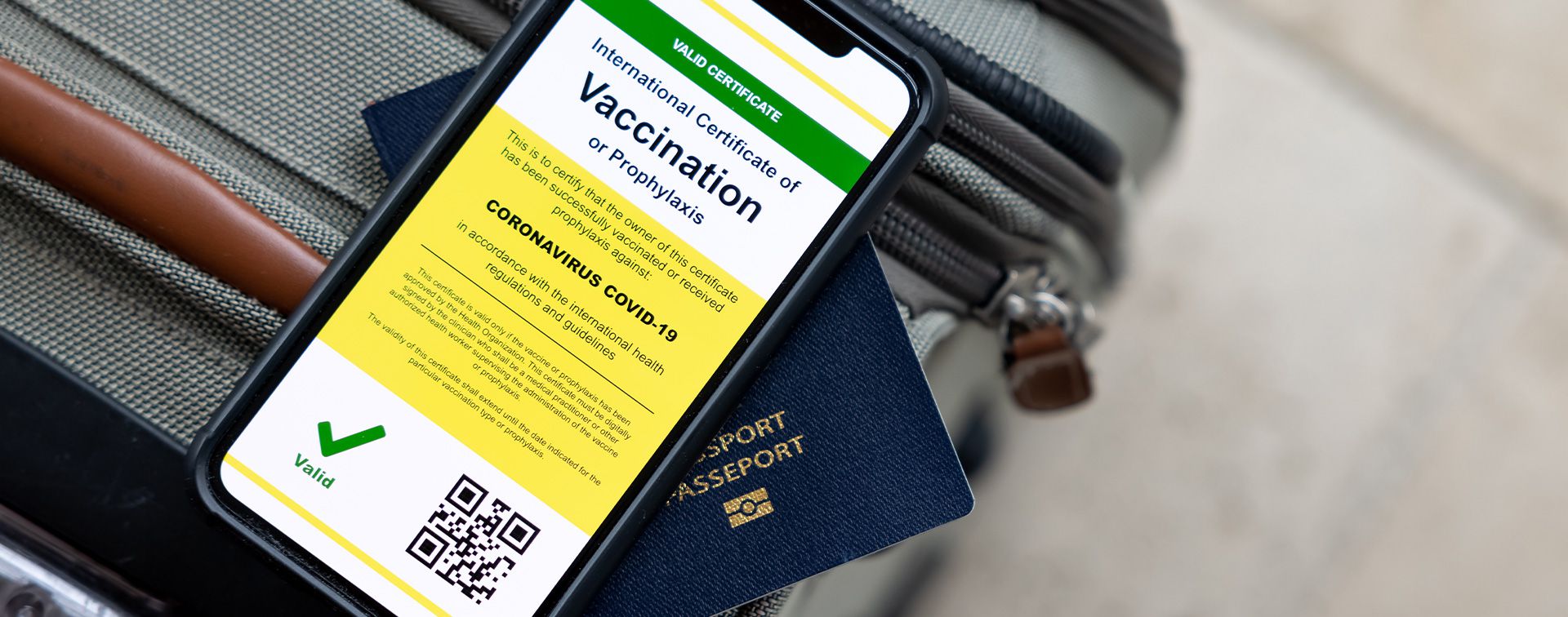
Robert Maciejewski is CEO of the SIP Medical Family Office, global leaders in providing International Health Insurance and Health Management solutions.
While it’s easy to get lost in ethical arguments surrounding so-called ‘Covid’, ‘immunity’, or ‘health’ passports and the discriminatory effects of their global enforcement on people who choose not to be vaccinated, one thing seems clear: moving forward, relatively unrestricted international travel will be possible only for holders of such passports, whatever form they may eventually take.
There are various initiatives around the globe to revive travel and enable national (leisure) activities for persons who have been vaccinated, have tested negative, or have recovered from a Covid-19 infection. Since 1 July, the European Commission’s ‘EU Digital COVID Certificate’ has been officially available to all EU citizens and residents as well as specific categories of travelers from third countries, enabling them to travel within the EU as well as Switzerland, Liechtenstein, Iceland, and Norway without any restrictions, as long as they possess such a certificate. The certificate is also available in paper form and proves that the holder has been vaccinated against Covid-19, received a negative test result, or recovered from Covid-19.

Some parallel initiatives on a national level include the UK government’s NHS App, France’s pass sanitaire (health pass), launched in June, which is available digitally via the TousAntiCovid app or in paper form, and Israel’s ‘Green Pass’ program, launched in February.
On the other hand, some countries take a different stance on mandatory immunity passports for their citizen travelers, such as the USA, which under the current Biden administration has made it clear that it will not enforce a digital Covid-19 health credential on any American business or citizen. Some states, such as Texas and Florida, have banned such certificates.
There is also a wide variety of offerings that have been developed by private, semi-private, and non-governmental organizations, such as the Travel Pass app launched by the International Air Transport Association (IATA), an organization representing nearly 300 airlines worldwide, and the CommonPass app created in coordination with the World Economic Forum.
The scope of Covid or health passports extends not only to international travel and restrictions on who can enter a country, or whether quarantine is required upon entry (with countries such as Cyprus, Greece, and Iceland requiring such proof for international travelers), but also to enabling leisure activities to resume, such as participating in public events, dining indoors without a mask, or visiting large retail and hotel chains — thereby reintroducing a semblance of normality within countries for those with proof of vaccination, immunization, or being free from infection.
Certain countries require any entrants to provide proof of medical insurance, which also covers the potential cost of Covid-19 hospitalization. To enter or obtain a visa for travel to Thailand, for example, travelers are required to present a certificate of insurance that explicitly confirms coverage for at least USD 100,000 for Covid-19 treatments. Israel and the Ukraine have similar requirements for anyone wishing to enter.
While there are hundreds of attempts around the world to provide a return path to ‘normality’ using (mostly digital) health passports, there remain many unanswered questions and a lack of global consensus, and there is no worldwide initiative to homogenize governmental and non-governmental activities.
There are various complex issues that health passports need to address: With some countries offering vaccinations in pharmacies and even in local retail stores, which vaccination centers and laboratories are accredited for testing? How can personal data and test results be safely exchanged and shared? Will the health passport be relevant only to Covid-19 or include information about other vaccinations and health-related issues? Will there be mutually accepted standards between governments of different countries around the globe?
There are also delicate political and diplomatic considerations. One example is China, which prioritized travelers who had received Chinese-made vaccines before they had been approved by the World Health Organization (WHO) while not recognizing internationally accepted vaccines such as those made by Pfizer, Moderna, and AstraZeneca — with some believing this to be a means to push Chinese-made vaccines internationally (Sinopharm and Sinovac were subsequently approved by the WHO in May and June, respectively). Another prominent issue is the wider availability of vaccines to citizens of wealthy countries, effectively leaving people from low-income regions behind.
Further potential concerns are privacy issues and the risk of data abuse by individuals or single organizations — for example, with the integration of the CommonPass into AppleHealth — and simple but important practical questions, such as the availability of sufficient rapid tests should countries with health passports require regular testing to maintain health passport validity.
Unfortunately for global citizens and would-be international travelers, rules and regulations change almost daily, making it difficult to track (and often to make sense of) the myriad rules put in place, abandoned, or changed when it comes to travel and to health passports in particular.
Another hurdle is that despite having health passports, some countries, such as Iceland, nonetheless require additional testing upon entry, negating their usefulness and general acceptance by the public. Other countries differentiate between travelers entering their territory by land and by air. Luxembourg, for example, imposes no restrictions on travelers entering by land, whereas those arriving by air must present a negative Covid test or antigen test, a Covid recovery certificate, or a vaccination certificate, adding further confusion to an already untransparent global situation. And to add insult to injury, some countries, such as Portugal have introduced different rules for different regions. Madeira requires only proof of vaccination or recovery while the rest of Portugal requires a negative PCR test conducted fewer than 72 hours before departure or a negative antigen test conducted fewer than 48 hours before departure.
The result is increasing frustration among the general population and growing number of people are refusing to be vaccinated.
As of now, the fact is — nobody has a clear answer to what is the best way forward when it comes to health passports. It took 50 years to establish the internationally accepted ‘nationality’ passport system we have today, while barely a year has passed since the pandemic was declared, and even less time since the various health passport initiatives have been started.
At the SIP Medical Family Office, we take care of the health of international travelers and global citizens on a daily basis, and we’ve heard all manner of ‘horror stories’ of people being stranded in remote locations, denied entry into countries, or forced into repeated quarantines (at their own expense, often in not very welcoming localities) when attempting to cross borders.
For global citizens who depend on international travel, my personal recommendation therefore is yes, get a health passport if you can access one wherever you live and, if possible, opt for government-issued digital passports or apps, which are more likely to be accepted by multiple states.
As to whether the benefits of having a health passport (and the freedoms returned to you by having one) outweigh the potential risks regarding privacy and data protection, and how concerned you should be about the minor but existing health risks around vaccination, these are questions that only you can answer. In the current climate, however, even if a legal obligation to obtain a Covid passport is unlikely in most democratic countries, not having one will likely result in de facto restrictions of your freedom, whether it comes to travel or to daily leisure activities.
References
Altundal, U, and Zarpli, O. “The Ethical Dilemmas Related to Covid-19 Vaccine Passports.” In the Global Mobility Report 2021 Q2. Henley & Partners, 2021.
“Application TousAntiCovid.” French Government Website
Bacchi, U. “COVID-19 Vaccine Passports: Everything You Need to Know.” Global Citizen. Global Citizen, February 16, 2021.
“CommonPass.” The Commons Project.
“Coronavirus (COVID-19).” NHS. National Health Service UK.
“Covid Insurance for Foreigners in Thailand.” Thai Embassy.
“EU Digital COVID Certificate.” European Commission.
Felter, C, “Vaccine Passports: What to Know.” Council on Foreign Relations. Council on Foreign Relations, April 7, 2021.
George, R. “At China’s Borders, “Vaccine Passports” Just Got Real.” FP. Foreign Policy, March 25, 2021.
“IATA Travel Pass Initiative.” IATA. International Air Transport Association, 2021.
IATA Travel Pass Q&A. IATA. International Air Transport Association, 2021.
Josephs, L. “Covid Vaccine Passports: Everything We Know so Far.” CNBC. CNBC LLC, May 22, 2021.
Mzezewa, T. “Coming Soon: The ‘Vaccine Passport’.” The New York Times. The New York Times Company, February 4, 2021.
“Pass Sanitaire.” French Government Website.
“Reise-Erleichterungen Für Geimpfte.” ADAC. ADAC. Accessed July 1, 2021.
Shepardson, D. “Biden White House in Talks with Airlines on Vaccine Passports; Will Issue Guidance.” Reuters. Thompson Reuters, April 7, 2021.
Villarreal, A. “Us Taking ‘Very Close Look’ at Vaccine Passports for International Travel.” The Guardian. Guardian News and Media Limited, May 28, 2021.